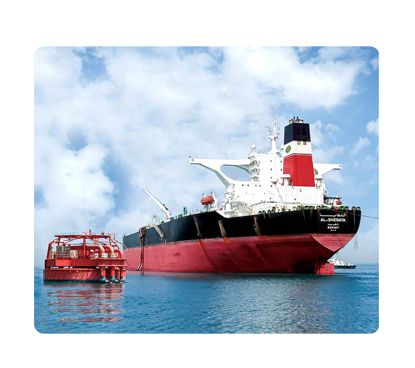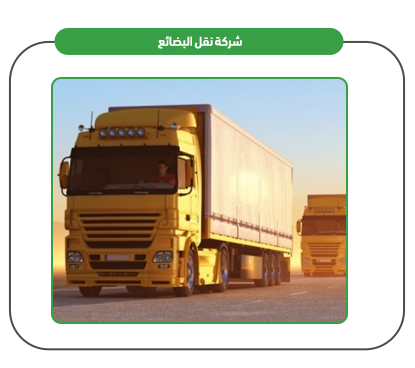The freight transport company is a key pillar of the logistics sector, offering integrated and diverse solutions for transporting goods and shipments between cities and countries, facilitating trade and strengthening connectivity between local and global markets. The company relies on multiple transportation methods to meet customer needs, from land transport, which provides flexibility in transporting goods via highways; to sea transport, which is characterized by its ability to accommodate large quantities of heavy shipments; to air transport, which ensures the speedy delivery of sensitive or urgent goods.

The freight transport company is one of the best choices for customers in the transportation and logistics sector. Its strength lies in a set of advantages that guarantee high-quality services and make it a profitable investment opportunity. First, the project enjoys a wide geographical spread, enabling it to cover numerous local and international markets, enhancing access to a diverse and growing customer base. Second, the company offers a variety of services, including land, sea, and air transportation, allowing customers to choose the most appropriate method according to their needs. Third, the company’s reliability ensures customers receive goods on time and in excellent condition, thanks to its reliance on precise and disciplined management that monitors all operations to the highest quality standards. The company also relies on modern technologies to operate its operations, contributing to improved efficiency and reduced operating costs. Furthermore, the company offers cargo insurance, providing customers with peace of mind and complete protection for shipments during transportation. These advantages, combined with effective marketing strategies and continued expansion into new markets, make the freight transport company a profitable investment opportunity, offering significant growth potential and high financial returns, enhancing the project’s chances of success in the market.



Wide geographical spread.
Diversity of services.
Reliability.
Strict and disciplined management supervision.
Using advanced technology in operations.
Cargo insurance services.
Executive summary
Study project services/products
Market Size Analysis
Risk Assessment
Technical study
Financial study
Organizational and administrative study

The service sector represents an important part of the economy, in fact, it represents the largest part of the global economy. The service sector is considered an industry and a science, focusing on the production of services rather than tangible goods, such as cars, aircraft, machinery, and equipment. The service sector is concerned with providing services to people, including banking, communications, wholesale and retail trade, engineering, medical services, tourism, and non-profit economic activities such as customer service and government services that include development, national defense, and maintaining internal and external security.
The commercial sector includes the e-commerce sector and the wholesale and retail trade sector. The commercial sector in the Kingdom has witnessed numerous developments during the years of the Ninth Development Plan. The number of commercial registrations issued by the end of the fourth year (2013) of the Ninth Development Plan increased to exceed 1.37 million registrations, while the number of companies reached more than 86,000. The number of licenses for installment sales, debt collection, and follow-up services reached 115,000. The recently released annual report issued by the Ministry of Commerce for the year 1435 AH revealed that the commercial sector contributed to the gross domestic product.
The relative contribution of commercial activities to GDP increased, with the wholesale and retail trade, restaurants, and hotels sectors contributing 8.8% to GDP, and construction and building 4.4%.

The number of internet users in the Kingdom increased from 19.6 million to 24 million between 2014 and 2016, according to a 2016 report by the Communications and Information Technology Commission. E-commerce is experiencing significant growth due to the availability of convenient payment methods, improved shipping methods, and changes in societal culture in recent years, driven by the availability of social media and the proliferation of smartphones, which have become an effective channel for completing many purchases. Data from the Saudi Payments Network (SPA) revealed that 2015 saw the recording of more than 1.1 billion financial transactions, with a total value exceeding 626.3 billion riyals, with an average monthly transaction volume exceeding 52 billion riyals. This was done through more than 17,000 ATMs and over 225,000 POS terminals spread across the Kingdom. The data added that last year saw steady growth in the number of POS terminals at payment outlets, increasing by 62% compared to the previous year.
The number of internet users worldwide reached 3.2 billion, with 157 million internet users in the Arab world. There are 11 million Facebook users in Saudi Arabia, including 3.2 million expatriates. There are 9 million Twitter users in Saudi Arabia, and 8.8 million Instagram users. Sixty percent of internet users in Saudi Arabia shop online, and 40% of online purchases are focused on mobile phones and accessories. 71% of shoppers in the Kingdom are young people, and 29% are women.